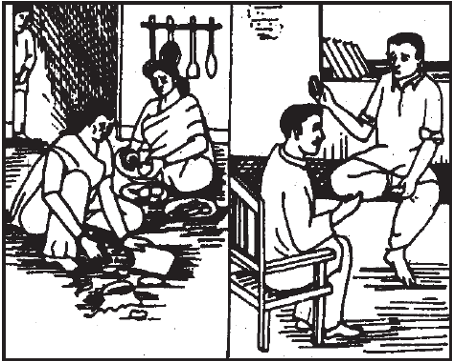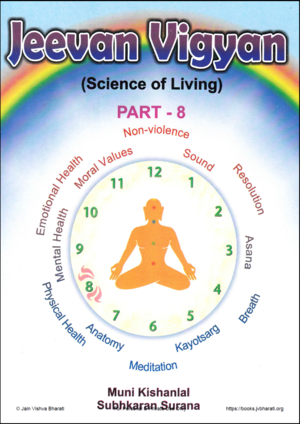Once a man wanted to buy a parrot. He went to a shop selling parrots and asked the price of a parrot. The shopkeeper said, "This parrot is for hundred rupees". The man was surprised. He said, "This is a very high price for a small little parrot". The shopkeeper replied, "I know it but this parrot speaks your language". The man thought for a moment and left the shop. Next day the man returned to the shop with a parrot and said to the shopkeeper, "I want to sell this parrot". The shopkeeper asked the price of the parrot. The man said, "This parrot said, "What are you talking? Who will pay such high a price for a mere parrot? My parrot is costing just hundred rupees." The man smiled and said, "You know your parrot speaks but my parrot thinks. He is always absorbed in deep contemplation. He is a philosopher."
One pays hundred rupees for a parrot that talks, but five hundred rupees for a parrot that thinks. Why is it so? It is so because thinking is one step higher than talking. Contemplation (Chintan) presupposes a developed mind. Hence, a higher price.
We have three mediums to perform our work. They are: body, speech and mind. Our body is primary because we use it to do manual work. Speech is another important medium. It helps us to communicate with people around us. Thus we can keep our relationships alive. Animals also have body but they do not have the gift of speech. After lot of research it has been proved that animals and birds also have a language of their own. Yet their language is not as well developed as the language spoken by a man. Language is a medium which has enabled us to form social contacts. It has streamlined the functioning of human society in general. But mind is more valuable than speech and language. All living creatures do not possess a mind. Those who do not have a language do not have a mind too. Man is the only being with a fully developed language of his own. Therefore, one who has a developed mind that can also think. The ability to think, to contemplate is more valuable than the ability to speak.
We have already mentioned that we have three instruments to carry on our work. With their help we proceed on our life journey. If these three are ideally balanced and work in coordination one will have happy experiences during one's journey. But if they are not balanced then one faces several obstacles in life that bring misery. No wonder under such unfavourable circumstances the boat of life capsizes in the midstream. This is how the mediums that brings us happiness can also pose problems. Therefore, it is important to discuss which medium can present what kind of problem.
Let's begin with our body. Old age decays our body. Diseases also attack our body. We feel pain in our body. In other words, body is the cause of our physical problems.
Then comes speech. Speech has also created innumerable problems for man since time immemorial. History is full of such instances when words have created havoc for human race. Unheeded words have so many times caused great wars. The extent to which speech can cause misery and unhappiness to a person is quite clear in the following couplet of Rahim: Crazy tongue slips back setting the listener afire, Poor head bears the blows of the listener's ire.
Now let us discuss the mind. The problems of mind are much more complicated than those of body and speech. The body can be tried up and restricted from indulging in harmful actions. One can restrict oneself from speaking by opting to be silent. But mind can neither be restricted nor can we stop its functioning. In other words, it is extremely difficult to restrict or to exercise any kind of control over mind. It is extremely difficult to say No to the mind. If the mind is healthy and is functioning in a balanced manner, the body also would be free from any disease or problem. When the mind becomes balanced, the quantity of food intake also becomes balanced by itself. In the same way, as soon as the mind becomes balanced, speech also gets restraint. We would wait till the other person completes his speech. We would like to hear what the others have to say before we give any reply. Very often we see that people violently react and interrupt others and do not allow them to complete their speech. By and large people have become too impatient to allow others to speak their mind. We do not realize that the other person may want to say something for our own good and that it might be totally illogical and irrelevant to react in a violent manner. If we give the matter a serious thought we will come to the conclusion that mental imbalance causes all such problems.
An anecdote will illustrate this point clearly. A glass tumbler fell in the kitchen and broke into pieces. A bang was all that was heard and total silence thereafter. The head of the family and his son were sitting in the room next to the kitchen. He asked his son, "What was that noise coming form the kitchen?" His son replied, "It seems that a glass tumbler has slipped from the hand of mother and is broken to pieces". His father became curious. He sent his servant in the kitchen to find out what had actually happened. The servant returned and reported, "A glass tumbler slipped from the hand of the mistress and broke".
The man asked his son, "How did you know? Do you have any extra-sensory-perception? How could you say that it was from your mother's hand that the glass tumbler slipped and broke?" The son said, "It was quite natural for the noise to stop after the bang because mother broke the glass. Had my wife been the culprit, noise of my mother's admonition would have continued for long."

It is strange situation. Elders sometimes behave in an undesirable manner. When younger behave that way, elders dislike it. They become agitated and the noise mentioned in this story goes on unabated. It happens because of nonequilibrium of mind. There are five factors which cause disturbance in the state of mental equilibrium. We will discuss them one by one:
-
EXCITEMENT : In the story mentioned above, we have seen that we do not react at all when we ourselves commit a mistake. But when younger commit the same sort of mistake, we get unduly excited. Reason for this kind of behaviour is our infatuation (Moorchha). In order to neutralize the effect of infatuation (Moorchha) we should exercise Dhyan which also helps us to exercise self-appraisal.
-
PREJUDICE: Man forms an opinion or a habit. He becomes miserable but still he does not give it up. Sometimes he realizes that he is wrong but still he does not correct himself because he does not want others to know of his weakness. Sometimes, to think of self-reform hurts his ego. An opinion or habit turns into prejudice. This also disturbs the mental equilibrium.
-
FAVOURITISM : Favouritism disturbs the mental balance of both the parties— one who indulges in it and the other who becomes a victim of it. For example, if a father while bequeathing his property gives a larger share to the younger son he causes mental disturbance to himself as well as to the elder son.
-
UNABALACNED DIET : Unbalanced diet causes imbalance in thought-process also. If we include one particular ingredient in our diet in excess, it causes extra stress on a particular organ of the digestive system. Gradually that organ stops functioning properly. The body needs proteins, fat, salts and various other ingredients which together form a balanced diet. An example will illustrate this point better. People whose diet lacks fat, are generally found to be short-tempered. Imbalance in diet result in irritation and tension.
-
DEBILITY OF NERVOUS SYSTEM: We have already learned about the human brain and spinal cord earlier in this book itself. Outside the spine, there are countless fibrils (Tantu), nerves (Snayu) and veins (Dhamani) forming a most complicated network. The main nerve within the spine starts from the brain and goes right up to the end of spine. To maintain this nerve and spine in a functional and healthy condition means to maintain a uniformly good health. For this purpose, the spine must be made flexible by means of the exercises of various asanas. Keeping the spine straight is all the more necessary while carrying out the exercise of Dhyan. That is why the Sadhaka is exhorted again and again to ensure that his spine, neck and head must be in a straight line in course of Dhyan or other Yogic exercises. A person, whose spine is not in a healthy condition will also suffer from mental disequilibrium.
These are the five factors, which lead to disturbance in mental equilibrium. If this imbalance is allowed to remain in our system, we cannot carry out the exercise of Dhyan. For this purpose we will have to shun our prejudices and partialities (favouritism) and other negative tendencies. We will have to balance out diet. In order to counter the effects of the state of excitement or agitation, we will have to carry out the exercise of self-appraisal. We will have to guard against the debility of the nervous system. The most important exercise in the way of achieving this goal is Shareer Preksha. It heals our mind. When mind is healthy, it is a state of mental equilibrium.
That particular procedure of Sadhana which solves our problems and makes our life happier and healthier is the one that can be called as the successful one. The Anupreksha of a Balanced Mind would take us to our goal. We have been carrying out the exercise of Anupreksha in the previous classes. We are now revising the same briefly here.
ANUPREKSHA FOR A BALANCED MIND
- Mahaprana Dhvani: 2 minutes.
- Kayotsarg: 5 minutes.
- Visualize respiration with green environment around the body. Green rays are entering with inhalation—3 minutes.
- (a) Concentrate on the Darshan Kendra and then carry out the Anupreksha. "The agitation is coming under control and discipline, mental equilibrium is being established". Repeat these words 9 times. Then carry out the Mansik Japa nine times.
(b) Contemplate, an ailing mind renders the body unhealthy. Mental health is most essential for physical health. Unnatural ambitions, intolerance and unpleasant events disturb the balance of mind. Mental imbalance is a great obstacle in the path of progress and success. We must not loose our mental equilibrium while facing a problem. Let's resolve. "I will maintain my mental balance even when I am struggling to solve my problems. I am fully confident that by virtue of constantly exercising the Prekshadhyan. I will be able to balance my mind to such an extent that even in unfavourable circumstances, it will continue to remain undisturbed." 5 minutes.
- Complete the exercise of Dhyan with the Mahaprana Dhvani—2 minutes.
EXERCISE
- Illustrate the usefulness of mental balance by an example.
- How is the coordination of mind, speech and body related to achievement of mental balance?
- What are the factors responsible for disturbance in mental balance?
- Which of the Jeevan Vigyan exercises are the most suitable for achieving mental balance?
- Describe all the aspects of Anupreksha of mental balance.
